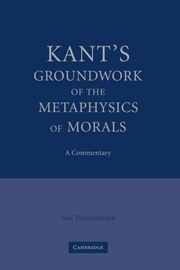Kant and the Supposed Right to Lie
In his 1797 essay 'On a Supposed Right to Lie from Love of Humanity', Kant argues that when only a confident lie might save a friend, one must, if asked, reply truthfully and thus betray his hiding-place to the person who wants to kill him. This is the first monograph to explore Kant's essay in detail. Jens Timmermann examines the background of the piece (Kant was provoked by Benjamin Constant and his translator, Carl Friedrich Cramer); the history of the example (which was also discussed by, amongst others, Augustine, Fichte and Johann David Michaelis); the peculiarities of Constant's version of the case; and Kant's core argument against Constant: lying, or a right to lie, would undermine contractual rights and spell disaster for all humanity. This rich, interpretative resource, which includes a facing-page translation of Kant's essay, will be of wide interest to Kant scholars and moral philosophers.
- The first monograph on one of Kant's most controversial and enigmatic texts, his 1797 essay 'On a Supposed Right to Lie from Love of Humanity'
- Traces the development of Kant's views on the duty to be truthful and provides a clear and detailed analysis within its historical and developmental context
- Includes a German text and a facing–page translation
Reviews & endorsements
'Timmerman confronts the mysteries of Kant's notorious little essay with philosophic rigour, historical insight, and a relentless commitment to illuminate Kant's ideas on their own terms. This book is a remarkable achievement.' Jacob Weinrib, Queen's University
Product details
February 2025Hardback
9781108834216
224 pages
229 × 152 mm
Not yet published - available from February 2025
Table of Contents
- 1. Introduction
- 2. Kant's Duties of Truthfulness
- 3. The Story of Kant's Essay
- 4. Theoretical Foundations, Supposed Solutions
- 5. The Intricacies of Constant's Example
- 6. A Right to the Truth in Another?
- 7. Form and Matter
- 8. Kant's Argument against Constant
- 9. Luck and the Imputation of Harm
- 10. What Kant Should Have Said.







